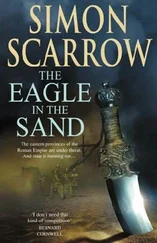I left the room with his cries of sacrilege echoing about me. I had not expected their co-operation, but their bitter, blind stubbornness and obstinacy in the face of danger made me feel sick. Their indifference and their fatalism had about it a hint of madness. I had met it in Britannia and in Italia—this blind refusal to face facts and to accept the need for change in a time of change. It was not new to me. If the empire were to die it would be because the people in it who held posts of responsibility no longer cared. They could not govern themselves and they had lost the confidence to govern others.
I found myself in the great hall that was the throne room. I called out and a servant came and lit the oil lamps. It was immense, the walls plastered and painted with faded designs which I found difficult to make out by the flicker of the yellow lamps. Galleries of wood ran round the walls, beneath windows whose outlines I could only just see in the half darkness. The floor on which my nailed sandals rasped was of marble, intricately patterned in black and white, and with glass mosaics that gave off a wonderful golden colour in the throne hall at the end.
I walked towards it, saw the raised dais and the great chair upon it that not even the Bishop had dared to take for the adornment of his faith. In this chair, in turn, they had sat, those emperors of Rome who had eaten and slept and worked in this city, and who had shouldered the burden that now lay upon my shoulders. Their ghosts came crowding in upon me out of the dark: the great Constantine who had created the new Rome; Julian, the ambitious Caesar of the West; Valentinian, the soldier-emperor who never in his life conceded a foot of Roman soil to barbarian rule; Constantius Chlorus who defeated Allectus the usurper of my island…. They had fought the barbarian all their lives and strengthened Rome’s frontiers, protecting always those who could build from the insensate fury of those who could only steal and destroy.
I mounted the dais and touched the arms of that golden throne hoping, perhaps, that it might transmit to me something of the power and the personality of those friendly ghosts whose faces, in my imagination, I could almost see. The vastness of the hall seemed overwhelming and I was conscious of a strange stillness and a quietness and peace such as I had never known. All these years the memory of Julian had haunted the jagged edges of my thoughts and he had stood, pale and reproachful, behind the faces of everyone to whom I spoke. The pain was always there….
The flames from the oil lamps stood upright and still and the darkness lifted a little and I could see a young man with a helmet upon his head and a sword in his hand. And behind was the black shadow of a bull. The man’s face I could not see for it was in the shadows but we looked at each other for a long time and I knew then that I was in the presence of my mystery.
“In the name of the Great Bull give me strength,” I cried, and my voice crashed in echoes round the walls and the high vault of the roof until it died.
In spite of the hypocaust it was very cold now, and the oil lamps spluttered as draughts of air played about the walls. The hall no longer seemed as light and down the far end I could see two figures, standing motionless among the shadows. They moved forward and I saw then that they were the Bishop and Quintus.
The Bishop said, “Do you aspire to the throne also, like Victorinus?”
I walked down the hall and passed him in silence. To him I would not speak. Quintus turned and followed me in puzzled silence.
Out in the street, on our return to Romulus, with the torches flaring in the summer night and the reassuring tramp of my guard about me, we looked at each other.
He said, “You went into that room of ghosts to ask a question. I see from your face that something happened. What, I will not ask. But this I do ask—did you receive an answer?”
“Yes,” I said. “It was not the answer I wanted, but that in itself is of no importance.”
“What will you do?” he said.
“I shall do what Stilicho asked. Afterwards, if the spirits are kind, I shall take over the province in the name of Honorius, not for myself, but for Rome.”
“Which province” he asked.
“I will tell you that when the time comes.”
The duty centurion showed the Curator into my office, and he sat down cautiously upon a stool facing the table at which I sat.
“Will you drink with me?” I said. He nodded and I poured him a cup. He watched curiously while I poured the libation. He said, “I have never seen a man do that before.” He looked at me steadily. “You know it is against the law?”
“Yes. Of course, this is a great centre of your religion. Do I offend you? I hope not.”
“It is wrong.”
“Is it? That is a matter we might debate all night. Come, if I can tolerate your faith I am sure that you can learn to tolerate mine.”
He did not smile. He said, “Do you really mean to close the frontier?”
“I do.”
“There is a silver mine at Aquae Mattiacae opposite Moguntiacum. It used to be worked by the government. But that was before I was born. Now the Alemanni use it. They set a high value on silver and they exchange it for goods that we are willing to sell them. Many of our merchants do a considerable trade across the river in pottery and glass and clothes and—other things.” He paused and then said pleadingly, “Many people will be upset if this trade is stopped.”
“I cannot help that.”
“You will not change your mind?”
“No.”
He said enviously, “You must be a very wealthy man.”
“I am not. But what has that to do with it?”
“Forgive me, but—if you are not—then I do not understand.”… He trailed off awkwardly into silence.
“I am sorry, I do not follow you.”
He said hesitantly, “Few imperial posts pay well. It has always been accepted custom that—well, there are ways in which one can add to one’s salary. There are certain perquisites, of course. This matter of closing the frontier is, surely, properly a matter for disputation before an appointed commission. You, as governor, have judicial powers. Those with vested interests would appear before you to plead their case. Such a matter would—would provide suitable—opportunities—for—for a settlement of some kind.”
I remained silent.
He said, “I—I thought that, perhaps, was what you had in mind.” He looked at me hopefully.
I said, “I understand quite clearly what you are saying. I would not presume to suggest that you are dropping hints on behalf of others. That would be ungenerous.” I paused. I said, “It is kind of you to take such a close interest in my welfare but it is quite unnecessary.”
“Then you really meant what you said?”
I nodded. “In administrative circles, I believe, there is a saying that good governors die poor. I shall do my best, I promise you, to live up to it.”
He said coldly, “Then if you really intend to close the frontier I shall have to report the matter to the Praefectus. It is my duty.”
“I shall not stop you. Tell me, Artorius, is that why the council was upset when we had that meeting? They have interests themselves, perhaps.”
He said stiffly, “A civic council is naturally concerned about trade. It is a part of their responsibility.”
“Naturally.”
He drank his wine and made a face as he did so.
I smiled. I said, “I am sorry if the wine is not up to your standard. As for myself—I have drunk tavern wine all my life.”
He said, “What did you wish to see me about then, if not the frontier?”
“A number of matters. I shall need a great deal in the way of supplies from the government factories here. My quartermaster will give your department the details. I shall need them quickly. The work must be speeded up. Five years ago when I needed helmets for my men I was told that each worker could only make four in a month. I want six.”
Читать дальше












